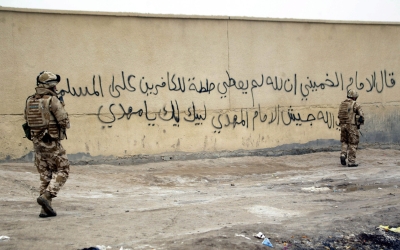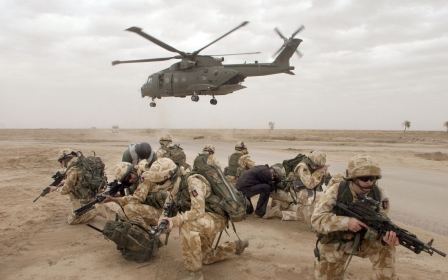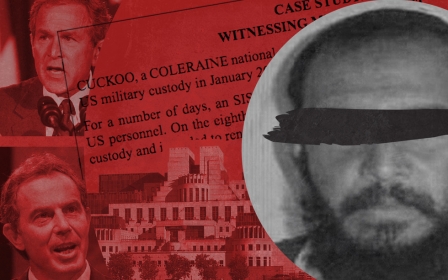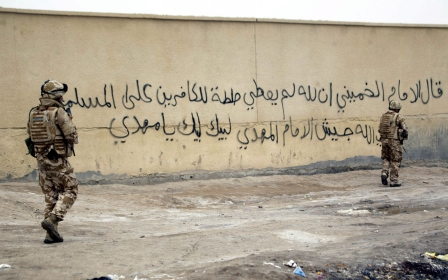Anger in Iraq at revelation of British shoot-to-kill policy against civilians
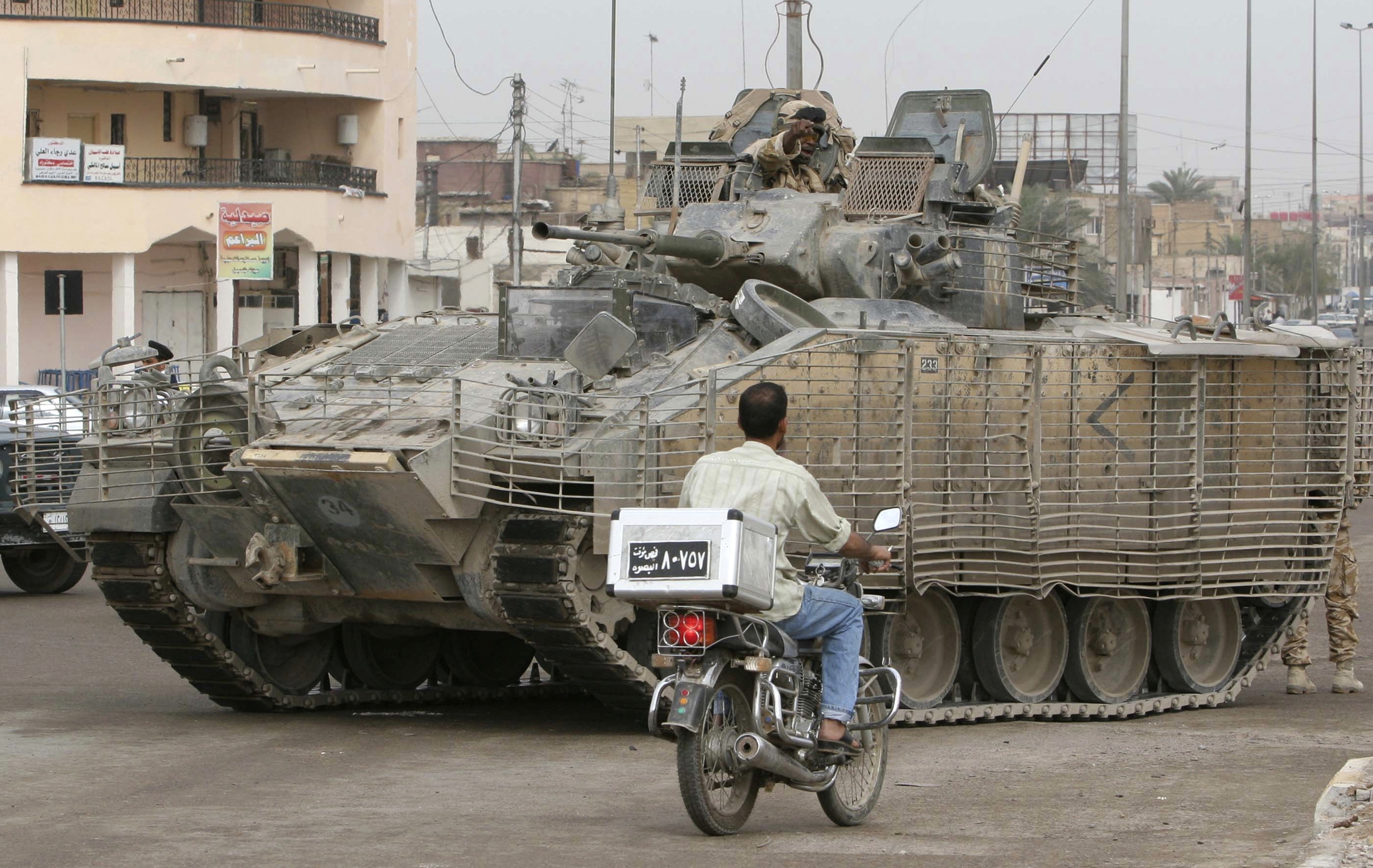
For Iyad Salim, revelations that British forces had in some circumstances allowed soldiers to fire at unarmed civilians during their occupation of the southern Iraqi province of Basra hardly came as a surprise.
“It’s all true,” he told Middle East Eye. "The British harmed us a lot.”
On Monday, MEE revealed that the British army had implemented rules of engagement in Iraq - as well as Afghanistan - that at times had allowed soldiers to shoot unarmed civilians who were suspected of keeping them under surveillance.
The report, based on the testimonies of former soldiers, has further cast a shadow on the legacy of the British forces’ conduct during the occupation of Basra, which lasted between 2003 and 2007 and saw numerous allegations of abuse against the province’s residents.
Salim, who still lives in Basra, said he experienced the impact of British violence against civilians first hand soon after the arrival of the occupying force in the aftermath of the US-led invasion that toppled Saddam Hussein.
“I was one of the people who were targeted while I was walking in Al-Zubair Bridge area in Basra. They targeted passersby with bullets,” he said. “There were a lot of civilians in the area which is near [the station].
“This was in April 2003. The British were killing anyone who was just walking around."
Former military personnel told MEE that the rules of engagement had at times been relaxed during operations in Basra and other British-occupied southern provinces, in part due to concerns that unarmed individuals had been acting as spotters for militants, or were involved in planting roadside bombs.
Two former soldiers told MEE that in 2007, at a time when British forces were frequently coming under attack or being targeted by roadside bombs, they had been told that they could shoot anyone holding a phone, carrying a shovel, or acting in any way suspiciously.
However, one of them said that he did not believe that all the victims had been keeping British troops under surveillance and said he had witnessed the killing of significant numbers of civilians in Basra in 2007.
The British army is militarily modern but it is humanely and morally backward
- Muntazar al-Zaidi, journalist
He said the result of relaxing the rules of engagement was “a killing spree”.
“Our commanders, they would tell us: ‘We will protect you if any investigation comes. Just say you genuinely thought your life was at risk - those words will protect you.'"
One of the primary antagonists of the British forces in Basra was the Mahdi Army loyal to Shia cleric Muqtada al-Sadr.
In May 2018, the Sairoun Alliance - a coalition of Sadr supporters, communists and other parties - won the largest number of seats in the Iraqi parliament.
Muntazar al-Zaidi, a journalist who ran, unsuccessfully, for Sairoun, told MEE that he had not previously realised the extent to which civilian deaths in Basra stemmed from intentional military policy.
"We thought these shootings were individual acts by soldiers or officers - we did not think that it was part of British military doctrine," he said.
Zaidi, who gained worldwide notoriety for throwing his shoes at former US President George Bush in 2008, said the report revealed a "colonialist" mentality on the part of the British military.
"This is cheap and low, and reminds us of the mentality and ethics of the medieval ages," he said. "The British army is militarily modern but it is humanely and morally backward.
"Truly, this is painful news. Every [unarmed] person shot in Basra by the British soldiers, we thought it was by mistake."
The UK Ministry of Defence has declined to comment on MEE's report.
Why was the British Army in Iraq and Afghanistan?
+ Show - HideThe UK sent forces to Afghanistan as part of the international coalition that invaded the country in 2001 following the 9/11 al-Qaeda attacks in the US, and to Iraq in 2003 as part of a US-led invasion to overthrow Saddam Hussein.
In both countries British soldiers became increasingly bogged down fighting against insurgents opposed to international occupation.
In Iraq, British forces were handed responsibility for security in Basra and three provinces in the south, but their presence was challenged by Muqtada al-Sadr’s Mahdi army militia fighters.
In September 2007, British forces withdrew from their bases in the city to the airport on the outskirts, the targets of “relentless attacks”, according to an International Crisis Group report which said that their retreat was viewed by locals as an “ignominious defeat”.
In Afghanistan, British forces had been deployed in 2006 to Helmand Province. But they proved ineffective against the resurgent Taliban and in 2009 more than 100 British soldiers were killed.
British troops eventually withdrew from Afghanistan in 2014, with 454 service personnel killed over the course of their 13-year campaign in the country.
The office of Prime Minister Adel Abdul Mahdi was contacted for comment, but had not replied at time of publication.
Salam Ali, international representative and central committee member of the Iraqi Communist Party, said the accounts of the British soldiers were "horrifying".
"The reported attempts to cover up killings warrant a proper independent investigation," he told MEE.
"It is wanton behaviour that is reminiscent of the way that employees of [the US security firm] Blackwater behaved in Iraq, with almost 200 shootings as documented by Congress," Ali said, notably mentioning the massacre at Nisour Square in Baghdad in 2007, when 17 civilians were killed.
"A proper investigation is also needed into similar incidents and the heavy casualties among civilians during the military campaign by the international coalition, including the UK, against Daesh since 2014," he added, using an alternative name for the Islamic State (IS) group.
Foreign forces
Although the UK handed over authority in Basra to local forces in 2007, 400 British troops still remain in Iraq, as part of the coalition to combat IS.
The continuing presence of British, American and other foreign troops in Iraq has angered Iraqi politicians, who claim the deployment is a threat to national sovereignty.
The two largest political factions in the Iraqi parliament, Sairoun and the Iran-backed Fatah coalition, have been reportedly working on drafting legislation that would see foreign troops pushed out of the country.
The leader of Asaib Ahl al-Haq, a powerful armed organisation linked to the Fatah coalition, has warned that if foreign troops failed to leave the country, they could be driven out by physical means.
"Iraq is a strong political state - there is an Iraqi parliament, most of its deputies reject in principle the presence of US forces and we believe that the Iraqi parliament is determined to issue a rejection decision," said Qais al-Khazali on Monday, speaking to al-Ghad Press.
He criticised comments made by US President Donald Trump on Sunday that US forces needed to remain in Iraq in order to "watch" Iran, saying the US was only interested in trying "to secure the Israeli entity".
"All Iraqi forces are able to impose the Iraqi sovereign decision not to use Iraqi territory as a platform. If US forces come with armies and fleets and are ready to lose seven trillion [dollars] - if needed, we are ready."
Middle East Eye delivers independent and unrivalled coverage and analysis of the Middle East, North Africa and beyond. To learn more about republishing this content and the associated fees, please fill out this form. More about MEE can be found here.


